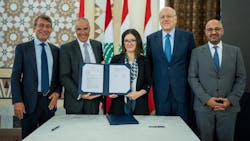UNICEF project to bring back 11 wastewater treatment plants in Lebanon
The United Nations Children’s Fund (UNICEF) has launched a new project to sustain wastewater treatment services in Lebanon.
The project will bring back into operation 11 key wastewater treatment plants (WWTP) across the country while promoting public awareness on wastewater impact on the environment and health.
In October 2022, Lebanon had suffered from a cholera outbreak. According to a report by reliefweb, the outbreak led to an estimated 5,000 cholera cases and 23 associated deaths.
Improving the functioning of WWTPs is also in synergy with UNICEF’s aims of reducing the vulnerability of children to water-borne diseases and therefore the impact on their health and nutritional status.
"The World Environment Day, that we celebrate today, sheds light on a painful reality that our country suffers from due to years of accumulated environmental crises and the absence of a radical action,” said Lebanon’s Prime Minister Najib Miqati. “During the recent cholera outbreak, we saw how UNICEF intervened to reach everyone with clean water, especially in the remote villages. Today, through the signing of this agreement with UNICEF in partnership with the European Union - which has never failed to assist Lebanon in fundamental and essential matters - we hope it will be an opportunity for the Lebanese Government to take responsibility in managing and improving these facilities instead of relying on others to do so.”
This project aims to bring back into operation 11 major wastewater treatment plants in various locations across Lebanon over a two-year period. However, much more investment and support is required for over 70 WWTPs that exist in the country in order to ensure that the environment is kept free from pollution at all times and in all places.
“Inadequate operation and maintenance of WWTPs and discharge of inadequately treated wastewater to the environment poses a major environmental and public health risk. The recent cholera outbreak reminds us of the dangers posed by pollution of the environment by untreated wastewater” said Ettie Higgins, UNICEF Deputy Representative in Lebanon. “With the European Union, we remain committed to strengthening the water establishments capacity to ensure equitable and sustainable provision of wastewater services to reduce the spread of infections and save lives."
